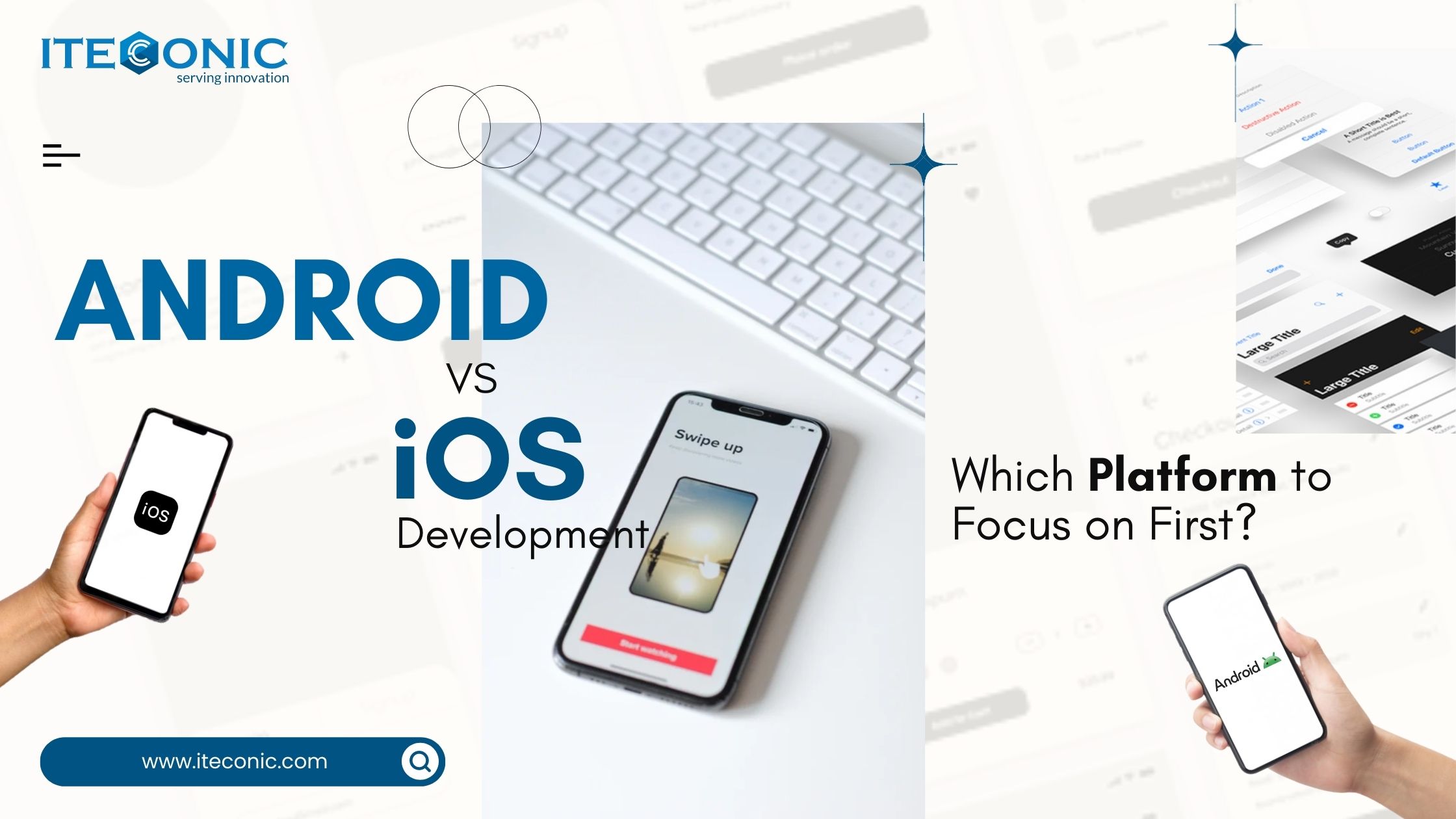Why Mobile Application Testing Is Critical For Business Success

Mobile application testing is a critical factor for the success of any web or mobile application. Ensuring a seamless user experience, compatibility across diverse devices and operating systems, and robust security are vital for user retention and positive reviews. Efficient testing saves costs by addressing issues early in the development stage while gaining app store approval and maintaining a reputable brand image. It grants a competitive advantage in a crowded market, as a well-tested app attracts and retains users. By simulating real-world scenarios, testing guarantees an app's reliability, boosting user engagement and ultimately driving the success of the mobile application.
With this comprehensive guide learn the major impact of mobile app testing and how it is helpful for mobile application developers before releasing it to the public domain. Apart from criticality, we are also going to discuss the crucial stages of testing that would decide whether your app is a hit or flop.
Let’s begin by understanding;
What is Mobile Application Testing? An Overview
Mobile app testing refers to the process of evaluating and verifying the functionality, usability, performance, and security of a mobile application before it is released to the public or made available in app stores. The goal of mobile app testing is to identify and rectify any defects or issues to ensure that the app functions as intended and delivers a positive user experience.
Also Read – Why mobile app development companies choose Flutter
A mobile application developer needs to keep in mind that the testing process involves running the app on various devices, operating systems, and network conditions to assess its compatibility and performance across different scenarios. It also includes testing for responsiveness, user interface, navigation, data handling, and backend integration. Additionally, security testing is performed to identify vulnerabilities and protect sensitive user data from potential threats.
By conducting comprehensive mobile app testing, developers and organizations can enhance the app's quality, increase user satisfaction, and reduce the risk of negative reviews or app failures in the market.
Types of Testing Succeed By Mobile Application Developer
Recently, a majority of companies and users are intrigued to know how app testing would be done and they are searching all over the internet for – Effective types of mobile app testing. With propelling knowledge and skills, ITEconic one of the most trusted mobile app development companies in the USA with extensive branches in India, UK, Canada, Dubai, UAE, Sydney, Washington, etc. proffers mobile app development services at a feasible cost.
The experts have a deep understanding of the application testing process, hence delivering a successful mobile app that promotes your company’s growth. To understand a bit more, multiple types of mobile application testing process leads to the security and privacy of the users in the long term.
|
Types of Application Testing |
Detailed Description |
| Functional Testing | In the process of functional testing, the core functionality of the developed mobile application, including the navigation menu, user interface, features, and functionalities would be tested thoroughly. |
| Usability Testing | In this process, the application’s complete user interface will be getting into the testing process to check if the application is easy to use and offers a rich user experience. If it passes the test then it will proceed further. |
| Security Testing | After knowing the harmful effect of cyber fraud, it is critical for mobile app development companies to run a security check while developing an app for the client’s business. Through security testing, mobile application developers rate the app’s security features |
| Performance Testing | Performance testing denotes the process to check and verify your application performance in terms of speed, stability, scalability, and responsiveness. |
| Compatibility Testing | This stage involves understanding the overall aspects of application compatibility with varied devices, screen sizes, and operating systems. |
| Localization Testing | Language creates a very immersive impact on your application performance. Hence it is vital to understand the cultures, languages, and regions of the target audience. |
One should note that testing your mobile application is crucial for businesses before its final launch. There are two ways of testing that you can go for – manual or automated, choose any of them based on your budget and time.
Plentiful Stages of Mobile Application Testing You Should Know
As we are in the mid of 2023, the stages of application testing have advanced immensely due to the expanding demand and growth of mobile applications developed by the top mobile app development companies worldwide. When we talk about the stages of mobile app testing then it would typically follow a structured process to ensure comprehensive testing and quality assurance. Here are the common stages that you should know for mobile app testing:
- Requirement Analysis: This stage involves understanding the app's functionalities, user expectations, and business requirements. It helps in creating test plans and strategies tailored to the app's specific needs.
- Test Planning: Test planning involves defining the scope of testing, determining the testing approach, selecting devices and platforms for testing, and creating a timeline for various testing activities.
- Test Environment Setup: In this stage, the mobile application developer and the testing team sets up the required hardware and software environments to mimic real-world conditions. It includes configuring different devices, emulators, simulators, and network settings.
- Unit Testing: Unit testing involves testing individual components or units of the app's code to ensure they function correctly in isolation. This phase is usually performed by the developers themselves.
- Integration and Functional Testing: Integration testing verifies the interactions between various components or modules to ensure that they work together seamlessly. While functional testing assesses whether the app meets its intended functionalities and requirements. Testers validate each feature and ensure they work as expected.
- User Interface (UI) Testing with Compatibility: UI testing focuses on the app's user interface to verify that it is visually appealing, consistent, and easy to use across different devices and screen sizes. On the other hand, compatibility testing checks the app's compatibility with various devices, operating systems, browsers, and network conditions to ensure consistent performance.
- Performance Testing: Performance testing evaluates the app's responsiveness, speed, and stability under various conditions, such as different network speeds, varying user loads, and extended usage.
- Security Testing: Security testing identifies vulnerabilities and weaknesses in the app to ensure the protection of sensitive user data and safeguard against potential security threats.
- Usability and Regression Testing: Usability testing involves gathering feedback from real users to assess the app's user-friendliness and overall user experience. While regression testing ensures that new changes or updates to the app do not negatively impact existing features and functionalities.
- From Beta to Final Testing: Talking about the beta stage, a limited number of users are given access to the app to test it in real-world conditions and provide feedback. Before the final release mobile application developers and testers ensures to run a final release test to check all quality standards and get to know if the application is free of critical issues.
It is quite evident that each stage of testing a mobile application is crucial to identify and address potential defects, ensuring the app's reliability, functionality, and user satisfaction. It's essential to perform a well-structured testing process to deliver a high-quality mobile app to end users.
Recently Added – What is Loyalty Programs?
Why Does Application Testing Matter for An Imperative UX?
Conducting application testing is essential for delivering an imperative user experience (UX) because it ensures that the app functions flawlessly and consistently across various devices and operating systems. Thorough testing identifies and resolves bugs, glitches, and performance issues that could disrupt user interactions, providing a seamless and enjoyable UX. Usability testing evaluates the app's ease of use and intuitive design, ensuring straightforward navigation for users.
Mobile app testing is vital for delivering an imperative user experience (UX) for several reasons:
- Bug-Free Functionality: Testing helps identify and fix bugs, glitches, and issues that could disrupt the app's functionality. A bug-free app ensures that users can navigate smoothly and use all features without interruptions, leading to a seamless and enjoyable experience.
- Consistency Across Devices and OS: Mobile devices vary in terms of screen sizes, resolutions, and hardware capabilities. App testing ensures that the UX remains consistent across different devices and operating systems, providing a uniform experience to all users.
- Optimized Performance: Performance testing assesses the app's responsiveness and speed. A well-tested app responds quickly to user interactions and loads content efficiently, enhancing user satisfaction and engagement.
- Usability and Intuitiveness: Usability testing helps gauge the app's ease of use and intuitiveness. A thoroughly tested app with a well-designed interface leads to straightforward navigation and a positive user experience.
- Enhanced User Engagement: A seamless UX encourages users to spend more time within the app. Engaging users with a user-friendly interface and compelling features increases the chances of retaining them and achieving business goals.
- User Retention and Loyalty: Users are more likely to stay loyal to an app that consistently delivers a great UX. Testing ensures that the app meets users' expectations, reducing the risk of negative reviews and uninstalls.
- Accessibility Compliance: Testing helps ensure that the app is accessible to users with disabilities. An inclusive app design considers various accessibility needs, fostering a positive UX for all users.
- Error Handling and Recovery: Robust testing assesses how the app handles errors and provides a smooth recovery process. This prevents user frustration and abandonment when issues occur.
- Security and Data Privacy: Testing helps identify security vulnerabilities that could compromise user data. A secure app builds trust among users, which is crucial for their continued engagement.
- Brand Image and Reputation: An app with a superior UX reflects positively on the brand and strengthens its reputation. Word-of-mouth promotion from satisfied users can lead to increased downloads and usage.
- Market Competition: With a plethora of apps available, users have high expectations for a flawless UX. Testing ensures that the app can compete effectively in the market and stand out from competitors.
Mobile app testing plays a pivotal role in creating an imperative UX by guaranteeing a reliable, user-friendly, and high-performing app. Investing time and effort in testing directly impacts user satisfaction, retention, and overall business success.
Brownie Guide to Read – Mobile App Development for Business
True-Tone Benefits of Mobile App Testing Process for Digital Business Growth
With the progressive technological approach, businesses are on the trend to introduce mobile apps to stay ahead of the competition. Meanwhile, to deploy a fully functional application it is important for the companies providing mobile app development services to run the application testing process for digital success. Over the years, mobile applications hold a leading space in our lives and have become an integral part. That’s the reason why mobile app development companies in the USA, like ITEconic, understand the benefits associated with the testing process.
Here are a few of them for your better understanding:
|
S. No |
Categories | Details |
| 1 | Improved User Experience (UX) | Thorough testing ensures a seamless and user-friendly app, enhancing the overall user experience. Positive UX leads to higher user satisfaction, increased engagement, and improved customer loyalty. |
| 2 | Higher App Ratings and Reviews | A well-tested app with minimal bugs and issues receives higher ratings and positive reviews on app stores. This positive feedback attracts more users and boosts the app's reputation. |
| 3 | Increased User Retention and Conversion | A reliable and bug-free app reduces the likelihood of user frustration and abandonment. This leads to higher user retention rates and improved conversion rates, benefiting the business's bottom line. |
| 4 | Cost Savings | Detecting and fixing issues early in the development process through testing is more cost-effective than addressing them after the app's release. It reduces the need for post-release bug fixes and maintenance. |
| 5 | Competitive Advantage | In a saturated app market, a well-tested app stands out from the competition. A positive user experience gives the business a competitive edge and increases the chances of users choosing their app over others. |
| 6 | Enhanced Security and Data Protection | Rigorous testing helps identify and address security vulnerabilities, safeguarding user data and protecting the business from potential data breaches and legal issues. |
| 7 | Optimized Performance | Performance testing ensures the app functions efficiently under various conditions, providing a fast and responsive user experience, which in turn improves user satisfaction. |
| 8 | Customer Insights | Testing provides valuable insights into user behavior and preferences. These insights can be used to make data-driven decisions for app improvements and new feature development. |
| 9 | Positive Brand Image | A well-tested app with a superior user experience reflects positively on the brand and enhances its reputation. A positive brand image can lead to increased brand loyalty and customer trust. |
| 10 | Higher Return on Investment (ROI) | An app that delivers an excellent user experience is more likely to attract and retain customers, leading to increased revenue and a higher ROI for the digital business. |
Overall testing your mobile application is crucial for digital businesses to ensure their app's success, customer satisfaction, and overall business growth. A well-tested app with an excellent user experience contributes to the business's competitiveness, profitability, and long-term success in the digital landscape.
Must Read Blog post – How to Develop a Restaurant Mobile App
How ITEconic’s Mobile Application Developer Helps Businesses with App Testing?
In the league of pure-play mobile and software testing companies globally, ITEconic has been offering reliable and trusted services in the field of mobile app development, web development, loyalty program services, along with other digital marketing solutions. Meanwhile, when our developers build your web or mobile app they ensure to serve superior testing outcomes with rich expertise for global clients. Over the years, we have worked with different clients from varied domains like retail, eCommerce, real estate, healthcare, telecom, etc.
ITEconic, offers a wide range of services for testing your mobile application with all-time featuring benefits, as our expert understands - A well-tested app with optimized performance enhances user engagement and retention, as users are more likely to stay loyal to an app that consistently delivers a positive experience. Moreover, testing helps address security vulnerabilities, safeguarding sensitive user data and building trust among users. A reliable and user-friendly app, achieved through detailed testing, fosters a positive brand image and reputation, making the app stand out amidst fierce market competition.
Frequently Asked Questions
Q1. Why is mobile app testing critical?
Mobile app testing plays a critical role in shaping an imperative UX, satisfying user expectations, and contributing to the app's success and popularity.
Q2. What major testing is done while developing mobile applications?
Almost every mobile app would be tested based on usability, performance, functionality, consistency, security, and other major parameters. This will help in increasing the reliability factor and general efficiency of the application amongst users.
Q3. Why is the mobile application testing process important for businesses?
A well-tested app with optimized performance enhances user engagement and retention, as users are more likely to stay loyal to an app that consistently delivers a positive experience. A reliable and user-friendly app, achieved through detailed testing, fosters a positive brand image and reputation, making the app stand out amidst fierce market competition.
.jpg)




.jpg)
.jpg)
.jpg)

.jpg)
 (1).jpg)
.jpg)
.jpg)

 (1).jpg)

.jpg)
 (2).jpg)
.jpg)
.jpg)

.jpg)





.jpg)
.jpg)
.jpg)

.jpg)
.jpg)
.jpg)



